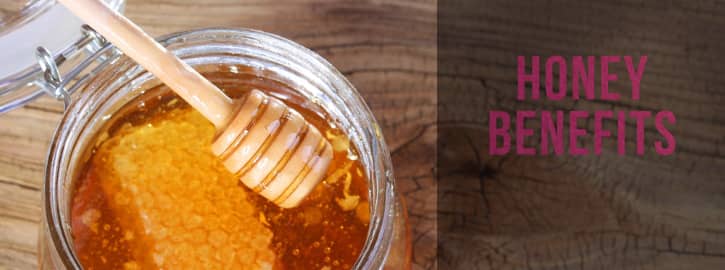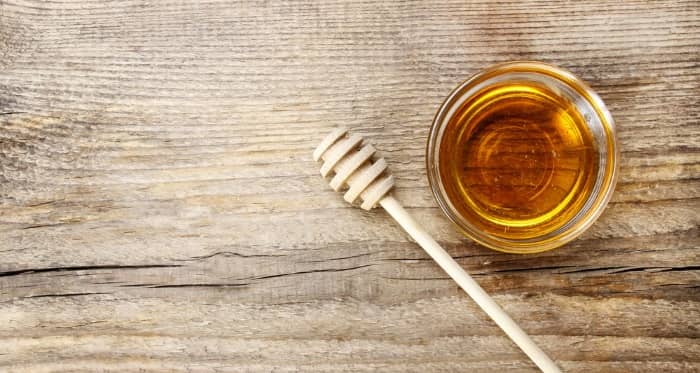Honey is the original natural beauty ingredient.
With a history of use stretching back over 2000 years.
The famous Egyptian queen Cleopatra bathed in honey and milk to keep her skin clear and smooth.
And another Egyptian queen Nefertiti—whose name literally means ‘the beauty has come’—used it as a regular part of her beauty routine.
But what exactly are the benefits of honey for skin?
Let’s take a close look.
The Benefits Of Raw Honey For Skin

Moisturizing
Honey is a humectant. Which means it can attract and retain moisture. And prevent its loss from the skin.
When applied to your face for 15-20 minutes and then washed off again, the trace residue keeps your skin feeling soft and hydrated.
Exfoliation
Honey is a gentle exfoliant of the skin because it contains gluconic acid.
Using a honey face mask can remove dead cells from the surface of your skin.
Leaving your face fresh, smooth, and glowing.
Skin Aging
The ability of honey to exfoliate the skin is useful for reducing the signs of aging.
With regular use, it can diminish fine lines and reduce the appearance of rough skin.
It also contains a number of antioxidants. Including flavonoids, polyphenols, vitamin B, and vitamin C.
These protect the skin from free radical damage. Often caused by exposure to pollutants in the environment and ultraviolet radiation from the sun.
This can help to prevent the formation of wrinkles, lines, and sagging skin over time.
Soothes Irritated And Inflamed Skin
When applied to the skin, honey has soothing properties that can calm inflammation.
It has well known anti-inflammatory effects that have been the subject of a lot of the scientific research that has been conducted. (1)
Acne
Honey is a popular home remedy for acne.
It’s often combined with other natural ingredients such as cinnamon, nutmeg, lemon, and avocado to make acne face masks.
There are many anecdotal reports from people who have successfully used honey in the treatment of acne.
But, actual scientific studies that examine its effectiveness on acne patients are currently lacking.
However, we do know that honey has antibacterial activity. And studies have shown that it can kill a wide range of bacteria (2).
This is currently thought to be a result of two main factors.
Firstly, the hydrogen peroxide it contains.
And secondly, a protein called bee-defensin-1. Added to the nectar when it’s in the bee’s stomach.
Studies involving manuka and kanuka honey have shown they are both capable of killing the acne-causing bacteria P. acnes in the laboratory (3).
And because of its high level of antibacterial activity, manuka honey has become popular in the natural skincare community.
Honey also has anti-inflammatory properties. This could be useful in the treatment of an inflammatory condition like acne.
Dermatitis
Dermatitis is a common skin condition that many people experience at some point in their life.
The itchy, dry, and cracked skin is both irritating and unpleasant looking.
And effective relief is a pressing concern for sufferers.
Scientific studies suggest that honey may be useful for the treatment of dermatitis.
In one study, 30 patients with seborrheic dermatitis applied raw honey diluted with warm water (90% honey) to the affected areas of skin.
This was performed every second day over a period of 4 weeks.
The honey was left on the skin for 3 hours before being washed off again.
The results were positive. And a continuation of the study over the next six months showed that regular application could prevent a relapse of the condition (4).
Psoriasis
Psoriasis is considered to be a disorder of the skin involving the immune response.
And honey has shown positive results as a treatment due to its anti-inflammatory properties.
But as of yet, there are only small studies and anecdotal reports of its effectiveness.
Rosacea
Rosacea is an unsightly skin condition which causes a persistent red rash.
Because it’s mainly found on the cheeks, nose, chin, and forehead of the face, it can cause a great deal of social discomfort for sufferers.
Evidence suggests that honey might be a natural treatment for rosacea.
In one study using a mix of 90% kanuka honey and 10% glycerin, 69 patients were treated for 8 weeks. The results indicated that the honey mix was an effective treatment (5).
It’s not fully understood how honey relieves rosacea. But it’s thought to be due to its anti-inflammatory and antibacterial action.
Wounds & Burns
The antibacterial, anti-inflammatory, and moisturizing properties of honey make it useful for healing small wounds and burns.
It’s even useful for relieving sunburn.
It prevents any infections from setting in. And Manuka honey is even sometimes used by doctors.
It’s Important To Choose The Right Type

So, you’re all ready to start slathering honey on your skin. But hold on a second.
You see, it’s important to make sure you use the right sort.If you want the full benefits, the best honey for skin is raw organic honey.
Why is this important?
Well, pasteurized and processed honey often lack beneficial enzymes and vitamins.
With many common commercial brands being so filtered that they don’t even contain any trace of pollen.
These ‘dead’ honeys are unlikely to retain the important antibacterial, anti-inflammatory, and antioxidant properties that make honey useful and healthy in the first place.
Medical grade manuka honey is best for wounds and burns. And is starting to find wider use in the medical community.
Final Thoughts
If you haven’t tried it yet, what are you waiting for?
Of all the natural skin care ingredients, honey has one of the best reputations for creating clear and beautiful complexions.
These days you can also find it in a wide range of beauty products. Including, soaps, face creams, and shampoos.
If you have tried using raw honey for skin, please share your experience in the comments below.


Great and informative website